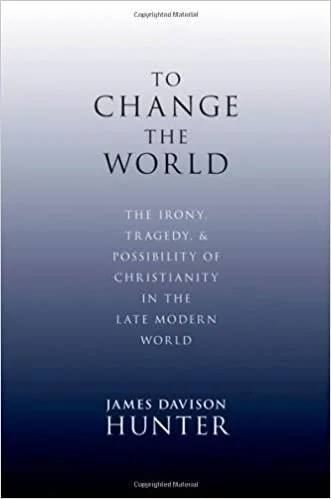Faithful Presence and its Antithesis
As I mentioned last week, I recently read To Change the World: The Irony, Tragedy, and Possibility of Christianity in the Late Modern World (Oxford), the phenomenal book by University of Virginia sociologist James Davison Hunter. In the book, Hunter goes after prevailing views of culture and “world-changing” among Christians, suggesting that most of us – the Christian Right, the Christian Left, and Neo-Anabaptists (to name three broad groups) – really don’t grasp the complexity of culture or the ways in which it actually changes. As such, he says, our efforts in cultural engagement are generally in vain, and sometimes even destructive.
Hunter’s proposal is that we redirect our energy to the practice of faithful presence – bearing witness to the coming Kingdom in small but faithful ways “in all spheres and all levels of life and activity.”
I find myself quite sympathetic to his argument, but I confess I haven’t quite wrapped my mind around all of the implications for how we speak about (much less practice!) mission, community development, politics, education, business, arts, media, and all sorts of other worthwhile undertakings that, it would seem, do in fact change the world, or at least shape it.
Others whom I really admire have reviewed and interacted with the book thoroughly, so I won’t do that here. But I do want to draw attention to one key insight I think is particularly poignant, and will be especially challenging to those of us who are pastors, ministry leaders, authors, bloggers, or anyone else with any sort of a public platform.
The practice of faithful presence, Hunter writes, requires that we be “oriented to the fruitfulness, wholeness, and well-being of all.” This sort of a posture may sound compelling in theory, but it’s very unpopular in practice, largely because it costs us something, and it rarely helps us get noticed or stay in the spotlight.
Instead, in my observation, pastors (especially those at the helm of larger churches) easily slip into a sort of territorialism, afraid or simply unwilling to publicly acknowledge the good, the true, and the beautiful represented in the ministries of other churches in town. While this may at times be rooted in a desire for “doctrinal purity” or simply the wisdom of learning when to say no, it often seems to have a great deal more to do with maintaining a sort of ecclesial empire. Savvy bloggers, meanwhile, jump on all the latest controversies (and some timeless ones too) – not because they have anything particularly interesting to say about them, much less any unique qualifications for weighing in – but because they’ve figured out what drives web traffic, and they like the adrenaline rush that comes with seeing a spike in Google Analytics. Empire-building is quite possible even in the world of pixels.
These temptations are understandable, certainly, but in the end they are still just that – temptations to be named, wrestled with, and resisted.
Hunter call these the temptations of celebrity, “a model of leadership that many Christians in prominent positions have a very difficult time resisting.” Celebrity, he argues, is “the antithesis of faithful presence.” He continues:
Celebrity is, in effect, based on an inflated brilliance, accomplishment, or spirituality generated and perpetuated by publicity. It is an artifice and, therefore, a type of fraud. Where it once served power and patrons, in our own day it mainly serves itself and its pecuniary interests. Celebrity must, of necessity, draw attention to itself. In American Christianity, the relentless pressure to raise funds within churches and para-church organizations reinforces the pressure toward celebrity, with an endless flow of direct mail, advertising, and ghost-written sermons, speeches, articles, editorials, and so on. These pressures are difficult to resist even for those who, by instinct, might find celebrity either tasteless or problematic. The reason is that celebrity is not just a certain kind of status one achieves but it is also a powerful institution the entire structure of which is oriented toward burnishing a leader’s image and projecting his or her visibility. The justification one often hears is that more people are reached in this way, yet there are often financial interests at stake for the celebrity leader and his or her organization, and these can either obscure or undermine the ends of outreach.
And so, whether leadership is expressed within the dynamics of celebrity or outright arrogance rooted in a sense of superiority, such leadership is artificial, unbiblical, organizationally unhealthy, inherently corrupting, and all too common in the Christian world – especially in the United States. Christianity needs to rediscover an alternative.
That alternative, as he sees it, is of course the practice of faithful presence. You’ll need to read the book for yourself to really grasp the extent of what he has in mind in using that term – and again, I really hope you do read it. And then, like me, you’ll probably need to spend some serious time pondering all the implications. But for now, I’d invite you to chew on this small but provocative snippet.
